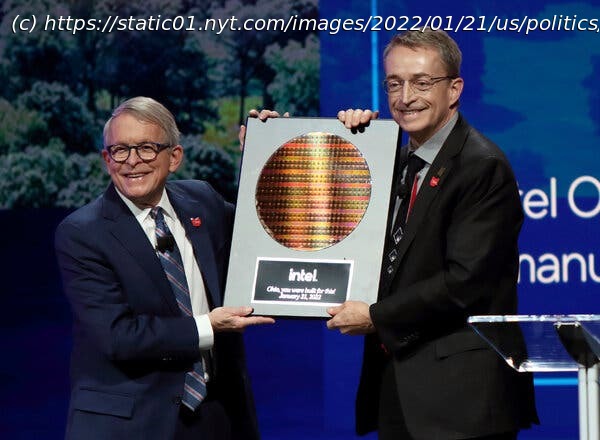The president said passage of a China competition bill was needed “for the sake of our economic competitiveness and our national security.”
In celebrating a $20 billion investment by Intel in a new semiconductor plant in Ohio, President Biden sought on Friday to jump-start a stalled element of his economic and national security agenda: a huge federal investment in manufacturing, research and development in technologies that China is also seeking to dominate. With two other major legislative priorities sitting moribund in Congress — the Build Back Better Act and legislation to protect voting rights — Mr. Biden moved to press for another bill, and one that has significant bipartisan support. But he has lost seven critical months since the Senate passed the measure, a sprawling China competition bill that would devote nearly a quarter of a trillion dollars to domestic chip manufacturing, artificial intelligence research, robotics, quantum computing and a range of other technologies. The bill amounts to the most expansive industrial policy legislation in U.S. history. Speaking at the White House, Mr. Biden said that America was in a “stiff economic and technological competition” with China. He chose the words deliberately, knowing that while it sounds obvious to American ears, Chinese officials in recent months have protested the use of the word “competition,” declaring that it has echoes of a Cold War-like contest. “We’re going to insist everyone, including China, play by the same rules,” Mr. Biden continued. “We’re going to invest whatever it takes in America, in American innovation, in American communities, in American workers.” He argued that the initiative would be a long-term solution to supply chain disruptions and rising inflation and would free American weapons systems from depending on foreign parts. After months in which he rarely mentioned the China competition bill so that he did not lose focus on other elements of his agenda, Mr. Biden said on Friday that its passage was needed “for the sake of our economic competitiveness and our national security.” “Today, we barely produce 10 percent of the computer chips despite being the leader in chip design and research,” he said. “We don’t have the ability to make the most advanced chips now, right now.” Pervasive shortages of chips, which are needed to power everything from cars and washing machines to medical equipment and electrical grids, have forced some factories to shutter their production lines and knocked a full percentage point off U.S. growth last year, according to some estimates. While the Biden administration has billed Intel’s new investment near Columbus, Ohio, as a partial remedy for supply chain disruptions that have led to global chip shortages and spurred inflation, the project would do little to resolve any economic problems in the short term. The Ohio plant, the first phase of what Intel said could be an investment of up to $100 billion, is not expected to begin operation until 2025, and many analysts have forecast chip shortages to begin to abate later this year.






